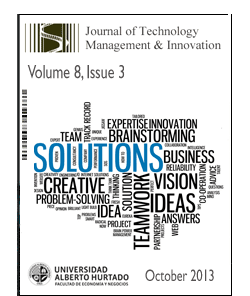A Study on Alternative Approaches to Instill Environmental Concerns in the Domain of Production Management of Industrial Firms
DOI:
https://doi.org/10.4067/S0718-27242013000400018Keywords:
Cleaner Production, Environmental Performance, Production Management, Productivity, SustainabilityAbstract
This article presents a comparative analysis of alternative models of production with environmental concerns that may lead to higher effectiveness in initiatives undertaken by industrial firms towards the development of more sustainable operations. The objective is to organize the knowledge on the subject of such models and provide guidelines that may help managers in selecting the most fitting approach for their business, according to the strategy and conditions of the firm. Among the presented models, the Cleaner Production model stands out for promoting the approach of nurturing the concurrent strengthening of quality, productivity, and sustainability in the existing manufacturing processes by dealing more comprehensively with factors internal to the firm that may be directly controlled by the managers.Downloads
References
ATLAS, M.; Florida, R. (1998). Green Manufacturing; In DORF, R. (ed.) Handbook of Technology Management. CRC Press.
BERKEL, R. van; Willems, E.; Lafleur, M. (1997). The relationship between cleaner production and industrial ecology; Journal of Industrial Ecology; v. 1; n. 1.
DICKINSON, D.A.; Draper, C.W.; Saminathan, M.; Sohn, J.E.; Wiliams, G. (1995). Green Product Manufacturing. AT&T Technical Journal; v. 74; p. 26-35.
DONG, X.; Li, C.; Li, J.; Wang, J.; Huang, W. (2010). A game-theoretic analysis of implementation of cleaner production policies in the Chinese electroplating industry. Resources, Conservation and Recycling; v. 54; p. 1442-1448.
FRESNER, J. (1998). Cleaner Production as a means for effective environment management. Journal of Cleaner Production; v. 6; p. 171-179.
FRONDEL, M.; Horbach, J.; Rennings, K. (2007). End-of-pipe or Cleaner Production? An empirical comparison of environmental innovation decisions across OECD countries. Business, Strategy and the Environment. v. 16; p. 571-584.
HART, S.L. (1994). How green production might sustain the world. Journal for the Northwest Environment. v. 10; p. 4-14.
HILLARY, R.; Thorsen, N. (1999). Regulatory and self-regulatory measures as routes to promote cleaner production. Journal of Cleaner Production. v. 7; p. 1-11.
ISO (2013a) database_iso_9001_iso_survey_2011.xls. http://www.iso. org/iso/ home/standards/certification/iso-survey.htm [Acessed February 19, 2013].
______ (2013b) database_iso_14001_iso_survey_2011.xls. http://www.iso. org/iso/ home/standards/certification/iso-survey.htm [Acessed February 19, 2013].
KLEINDORFER, P.R.; Singhal, K.; Wassenhove, L.N. van (2005). Sustainable Operations Management. Production and Operations Management; v. 14, n. 4; p. 482-492.
LOWELL ([1995]). What is Sustainable Production? Lowell Center for Sustainable Production, University of Massachusetts Lowell. http://www.sustainableproduction.org/abou.what.php [Accessed November 18, 2011].
LUKEN, R. A.; Navratil, J. A. (2004). Programmatic review of UNIDO/UNEP national cleaner production centres. Journal of Cleaner Production. v. 12, p. 195-205.
MOORS, E.H.M.; Mulder, K.F.; Vergragt, K.F. (2005). Towards cleaner production: barriers and strategies in the base metals producing industry. Journal of Cleaner Production. v. 13; p. 657-668.
MULDER, K. (1998). Sustainable consumption and production of plastics? Technological Forecasting and Social Change, v. 58, p. 105-124.
PAILTHORP, R. (1977). Alternatives to End-of-Pipe treatment, Civil Engineering, v. 47, n. 2, p. 49-52.
PNUMA ([2003]). Eficiência de Recursos: Consumo e Produção Sustentáveis. Programa das Nações Unidas para o Meio Ambiente. http://www.unep.org.br/interna.php?id=53 [Accessed November 18, 2011].
REPETTO, R. (1987). Economic incentives for Sustainable Production. The Annals of Regional Science; v. 21; n. 3; p. 44-59.
ROBÈRT, K.-H; Schmidt-Bleek, B.; de Larderel, J.A.; Basile, G.; Jansen, J.L.; Kuehr, R.; Thomas, P.P.; Suzuki, M. Hawken, P.; Wackernagel, M. (2002). Strategic sustainable development – selection, design and synergies of applied tools. Journal of Cleaner Production. v. 10, p. 197-214.
ROTHENBERG, S.; Pil, F. K.; Maxwell, J. (2001). Lean, Green and the quest for superior environmental performance. Production and Operations Management; v. 10; n. 3.
UN (1992). Agenda 21: Programme of Action for Sustainable Development. Conference on Environment and Development, Rio de Janeiro, Brazil.. New York: United Nations. http://www.un.org/esa/dsd/agenda21/ [Acessed June 20, 2011].
______ (2000). UN Millennium Development Goals (MDG); 60th United Nations General Assembly, Millenium Summit; New York. http://www.un.org/millennium/summit.htm. [Acessed June 20, 2011].
______ (2003). 10 YFP – 10 Years Framework Process; Marrakesh Process; First meeting scheduled by World Summit for Sustainable Development in Johannesburg (Rio+10); Marrakesh. http://www.unep.org.br/interna.php?id=53. [Acessed Jun 20, 2011].
UNIDO ([199-]). Cleaner Production definition. United Nations for Industrial Development Organization. http://www.unido.org/index.php?id=o5152. [Accessed February 27, 2011].
VELEVA, V.; Ellenbecker, M. (2001). Indicators of sustainable production: framework and methodology. Journal of Cleaner Production, v. 9, p. 519-549.
Downloads
Published
How to Cite
Issue
Section
License
Copyright (c) 2013 Journal of Technology Management & Innovation

This work is licensed under a Creative Commons Attribution-ShareAlike 4.0 International License.







